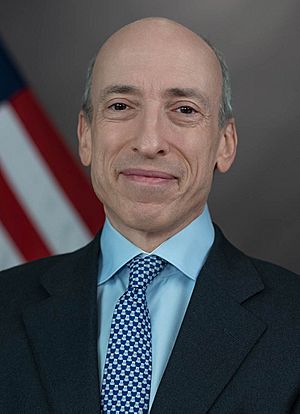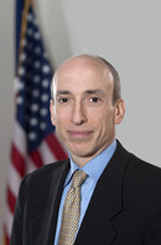Gary Gensler facts for kids
Quick facts for kids
Gary Gensler
|
|
|---|---|

Official portrait, 2022
|
|
| 33rd Chair of the Securities and Exchange Commission | |
| In office April 17, 2021 – January 20, 2025 |
|
| President | Joe Biden |
| Preceded by | Allison Lee (Acting) |
| Succeeded by | Mark Uyeda (Acting) |
| Commissioner of the U.S. Securities and Exchange Commission | |
| In office April 17, 2021 – January 20, 2025 |
|
| President | Joe Biden |
| Preceded by | Jay Clayton |
| Succeeded by | Paul S. Atkins |
| 11th Chair of the Commodity Futures Trading Commission | |
| In office May 26, 2009 – January 3, 2014 |
|
| President | Barack Obama |
| Preceded by | Reuben Jeffery III |
| Succeeded by | Timothy Massad |
| Under Secretary of the Treasury for Domestic Finance | |
| In office April 1999 – January 20, 2001 |
|
| President | Bill Clinton |
| Preceded by | John Hawke |
| Succeeded by | Peter Fisher |
| Assistant Secretary of the Treasury for Financial Markets | |
| In office September 1997 – April 1999 |
|
| President | Bill Clinton |
| Preceded by | Darcy Bradbury |
| Succeeded by | Lee Sachs |
| Personal details | |
| Born |
Gary Scott Gensler
October 18, 1957 Baltimore, Maryland, U.S. |
| Political party | Democratic |
| Spouse |
Francesca Danieli
(m. 1986; died 2006) |
| Children | 3 |
| Education | University of Pennsylvania (BS, MBA) |
Gary Scott Gensler (born October 18, 1957) is an American former government official and investment banker. He served as the head of the U.S. Securities and Exchange Commission (SEC) from 2021 to 2025. Before this, Gensler worked for Goldman Sachs, a big investment bank. He also taught at the MIT Sloan School of Management.
Gensler was the 11th chairman of the Commodity Futures Trading Commission (CFTC) under President Barack Obama. This was from 2009 to 2014. He also worked in the United States Department of the Treasury. President Joe Biden chose Gensler to lead the SEC. He took over from Allison Lee.
Contents
Early Life and School
Gary Gensler was born in Baltimore, Maryland. He was one of five children in his family. His father sold cigarettes and pinball machines. This gave Gary his first look at how money works in the real world.
Gensler went to Pikesville High School. He graduated in 1975. Later, he received an award from his old school. He then studied economics at the Wharton School at the University of Pennsylvania. He finished his degree in three years. The next year, he earned a master's degree in business. His identical twin brother also went to the University of Pennsylvania. Gary was a coxswain for the university's rowing team. He had to keep his weight low for the boat.
Career in Business
In 1979, Gensler started working at Goldman Sachs. He stayed there for 18 years. At 30, he became one of the youngest partners at the company. He worked on big business deals called mergers and acquisitions. He also helped Goldman Sachs advise the National Football League. This led to a huge television deal for the NFL.
Later, Gensler moved to Tokyo. There, he managed the company's trading in bonds and currencies. His last job at Goldman Sachs was co-head of finance. He was in charge of accounting and money management worldwide. Gensler left Goldman Sachs when President Bill Clinton nominated him for a government role.
Public Service Roles
Gary Gensler worked in the United States Department of the Treasury. He was the Assistant Secretary for Financial Markets from 1997 to 1999. Then, he became the Undersecretary for Domestic Finance from 1999 to 2001. As Assistant Secretary, he advised the Treasury Secretary. He helped create policies for managing government debt.
As Undersecretary, Gensler advised on many financial topics. These included financial institutions and capital markets. He also worked on government lending. He received the Alexander Hamilton Award for his service. This is the highest honor from the Treasury Department.
Helping Write Sarbanes-Oxley
In 2001, Gensler joined Senator Paul Sarbanes' team. He helped write the Sarbanes–Oxley Act. This law made accounting rules stricter. It was created after big company scandals like Enron and WorldCom.
Leading the CFTC
President Barack Obama chose Gensler to lead the Commodity Futures Trading Commission (CFTC). He was confirmed by the U.S. Senate in 2009. Gensler promised to make financial markets more open. He wanted to protect investors and lower risks.
Gensler was seen as a key reformer after the 2008 financial crisis. He worked to regulate the huge financial derivatives markets. These markets were a big part of the crisis. He helped pass the Dodd-Frank Wall Street Reform and Consumer Protection Act. This law brought more rules to the swaps market. Under Gensler, the CFTC wrote many new rules. This helped regulate a $400 trillion market.
Investigating Libor Manipulation
Gensler also strengthened the CFTC's enforcement division. They investigated the manipulation of Libor. Libor is a key interest rate used around the world. It affects many financial products, like loans.
Gensler worked with his team to investigate. They charged five financial companies. These companies had manipulated Libor and other rates. This resulted in over $1.7 billion in penalties. For example, Barclays paid $450 million in fines. Gensler believed Libor was "unsustainable" and should be replaced.
Protecting Consumers in Maryland
In 2017, Gensler became Chairman of the Maryland Financial Consumer Protection Commission. This group looked at how federal financial laws affected Maryland. Under his leadership, the Commission suggested changes to state law. These changes aimed to protect consumers better.
They recommended clearer rules for student loan companies. They also worked to protect buyers of manufactured homes. In 2018, new laws were passed based on their work. These laws created a student loan ombudsman. They also increased fines for violations. In 2019, more laws were passed to protect student borrowers.
Leading the SEC
In November 2020, Gensler joined President Joe Biden's transition team. He focused on financial regulators. On April 14, 2021, the Senate confirmed him as the 33rd chair of the U.S. Securities and Exchange Commission (SEC). He concluded his term on January 20, 2025.
Regulating Cryptocurrencies
As SEC Chair, Gensler talked about regulating cryptocurrency and other digital assets. In September 2021, he said the SEC needed more staff. He compared the crypto market to a "Wild West." He believed most crypto projects dealing with securities should be regulated by the SEC.
In October 2021, the SEC approved the first bitcoin futures exchange-traded fund (ETF). Gensler supported this. However, he was against approving "pure play" bitcoin ETFs. He worried about fraud and market manipulation with bitcoin.
On January 9, 2024, a fake post about approving spot bitcoin ETFs appeared on the SEC's X account. Gensler quickly said the account was "compromised." This fake post caused a brief jump in bitcoin's price. Gensler also announced that the SEC would start regulating cryptocurrency exchanges. He warned that many cryptocurrencies might fail. He also expressed concern about their impact on traditional financial markets.
Financial Market Rules
Gensler testified before Congress about events like the GameStop short squeeze. He looked into issues like Robinhood Markets and high-frequency trading. He also focused on how online brokers make money from trades.
In June 2021, Gensler announced the SEC would review market structure. He considered banning "payment for order flow." This is when brokers get paid to send customer orders to certain trading firms. He also stressed the need for rules to prevent insider trading.
In August 2021, the SEC approved new rules for companies listed on Nasdaq, Inc.. These rules required companies to have diverse board members. This included at least one female member and one racial minority or LGBTQ member. However, a court later struck down this rule. In December 2021, Gensler proposed a rule for corporate executives. It would require a 120-day waiting period for changes to their stock plans. This was in response to record stock sales by executives.
In June 2022, Gensler announced rule changes for market makers. They would have to share more data about payments for order flow. They would also need to show how quickly trades are completed.
Greenwashing and ESG
Gensler also focused on ESG issues. This includes how companies report their impact on the environment and society. In March 2022, the SEC approved rules requiring companies to disclose climate risks. They also had to report their contribution to greenhouse gas emissions.
In May 2022, the SEC proposed two rules for ESG investment funds. These rules aimed to prevent "greenwashing." Greenwashing is when companies mislead people about their environmental efforts. The rules also aimed to increase transparency about ESG impacts. The SEC reportedly investigated Goldman Sachs' ESG funds for potential greenwashing.
Social Media and Markets
Gensler also looked at how social media affects financial markets. In March 2021, Rocket Mortgage stock surged due to online discussions. The SEC later released a report on the GameStop short squeeze.
In October 2021, former Meta Platforms employee Frances Haugen filed complaints with the SEC. She alleged securities fraud by Facebook, Inc. (now Meta Platforms). She leaked company documents and testified about them.
The SEC also investigated a merger involving Trump Media & Technology Group. This was due to concerns about possible securities law violations.
Tesla and Twitter
Gensler's SEC also dealt with issues involving Tesla, Inc. CEO Elon Musk. In November 2021, Musk polled his Twitter followers about selling Tesla stock. The SEC opened an investigation into Tesla. This was due to a whistleblower complaint about fire risks with its solar panels.
The SEC also subpoenaed Tesla for information about its governance policies. This was related to a 2018 settlement with Musk over a tweet. Musk's lawyers argued the SEC was limiting his freedom of speech.
In April 2022, Musk bought a large stake in Twitter. He later offered to buy the entire company. The SEC investigated Musk for missing filing deadlines. Twitter shareholders also sued Musk for failing to disclose his ownership stake on time. Musk later tried to back out of the Twitter deal. He claimed the company had too many fake accounts. Twitter then sued Musk to force the acquisition. The SEC also requested more information from Musk about his Twitter filings.
Author
Gary Gensler co-authored a book called The Great Mutual Fund Trap. The book explains that most mutual funds don't perform as well as the overall market. It suggests that investors should choose low-fee index funds instead.
Political Involvement
Gensler was involved in politics in Maryland. He served as treasurer for the Maryland Democratic Party. He also held roles in campaigns for Senator Barbara Mikulski and Governor Martin O'Malley. During the 2008 presidential campaign, he advised Hillary Clinton and later Barack Obama. In 2015, he became the chief financial officer for Hillary Clinton's presidential campaign.
Academic Work
Gensler is a professor at the MIT Sloan School of Management. He studies how finance and technology connect. He teaches about blockchain technology, digital currencies, and financial technology. He is also part of the New York Fed Fintech Advisory Group. This group advises on financial technology. Gensler won the MIT Sloan Outstanding Teacher Award in 2018–19.
Personal Life
Gary Gensler lives in Baltimore. He has three daughters: Anna, Lee, and Isabel. He was married to Francesca Danieli from 1986 until her death in 2006. She passed away from breast cancer. Gensler enjoys running and has finished many marathons. He has also climbed Mount Rainier and Mount Kilimanjaro.
See also
 In Spanish: Gary Gensler para niños
In Spanish: Gary Gensler para niños
 | Kyle Baker |
 | Joseph Yoakum |
 | Laura Wheeler Waring |
 | Henry Ossawa Tanner |


